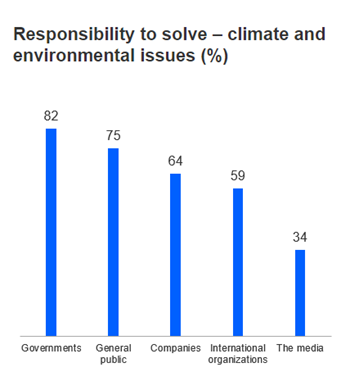We are, by now, overwhelmed with evidence that general publics around the world are concerned about climate, environmental and social issues – the core topics of sustainability.
Throughout 2022, Kantar tracked spontaneous concerns amongst people in 19 nations (between them accounting for 68% of Global GDP) across all continents. Of those issues deemed most in need of solution, the economy came first closely followed by climate and environmental issues, then inflation and social issues roughly level with each other.
Cynics point to the significant value-action or intention-action gap as evidence that this reported concern is flimsy, putting all the responsibility for inaction on the public. We know that the public is very willing to do its part but not alone and rejects this analysis. They can see that this is getting personal with implications for their health, living conditions, society and prosperity. According to Kantar’s Global Issues Barometer data, 71% of people agree with the statement, "People like me need to do whatever we can to fight climate change". And 61% see a connection between climate change, pollution and our health.
People would like to make better choices when they shop but they need help in being able to find, afford and adopt more sustainable options. In our latest booklet, we talk about why Brands are in pole position to help and to benefit from doing so. 
(Source: Global Issues Barometer, 2022)
This requires the provision of identifiable, sustainable options at prices that people can afford and in ways they can adopt.
Currently, sustainable choices come at a significant premium. In many cases this makes sense and has been the incentive for early movers to enter the sector. But we have passed the point where this remains a feasible strategy for brands at large and it is now holding back a mass market.
A transformational moment for brands
It is urgent that we address issues of environmental degradation, bio-diversity loss and climate change; people expect this from business and from the brands they buy but currently 38% of them believe business is making the climate crisis worse. If sustainable solutions are available only at very premium prices, positioned as a luxurious lifestyle choice, we will not address the issues; this mass market will not be served and brands will fail to realise the opportunity it offers.
This is a moment for brand owners to look across their portfolios and audiences to identify opportunities to serve these needs and how to do that; to examine the cost and pricing assumptions that are holding them back from making solutions more widely accessible; to identify other benefits that enhance or are enhanced by sustainability; and to test their communications and packaging to ensure these options and benefits are getting across.
Bridging the Value-Action gap
Meeting this opportunity also means product and service design that accounts for current behaviour or facilitates new behaviours, using behavioural science thinking to help a brand owner design for sustainable outcomes. Understanding what deters people or what motivates them is at the heart of making this work, overcoming the value-action gap by making sustainable choices positive and desirable as well as easy to identify and adopt. And it means doing this at some speed. Not only because this is the crucial decade for significant action but also because brands risk people turning away in disbelief where they see no satisfactory solutions or suspect a brand of greenwashing. This should be a transformational moment and with the right insight, will and action, it will be.To learn more about how we can help brands to scale the sustainability engagement please read our latest booklet Are brands failing to their customers on Sustainability? And of course, please get in touch with our sustainability experts to discuss our findings further.

